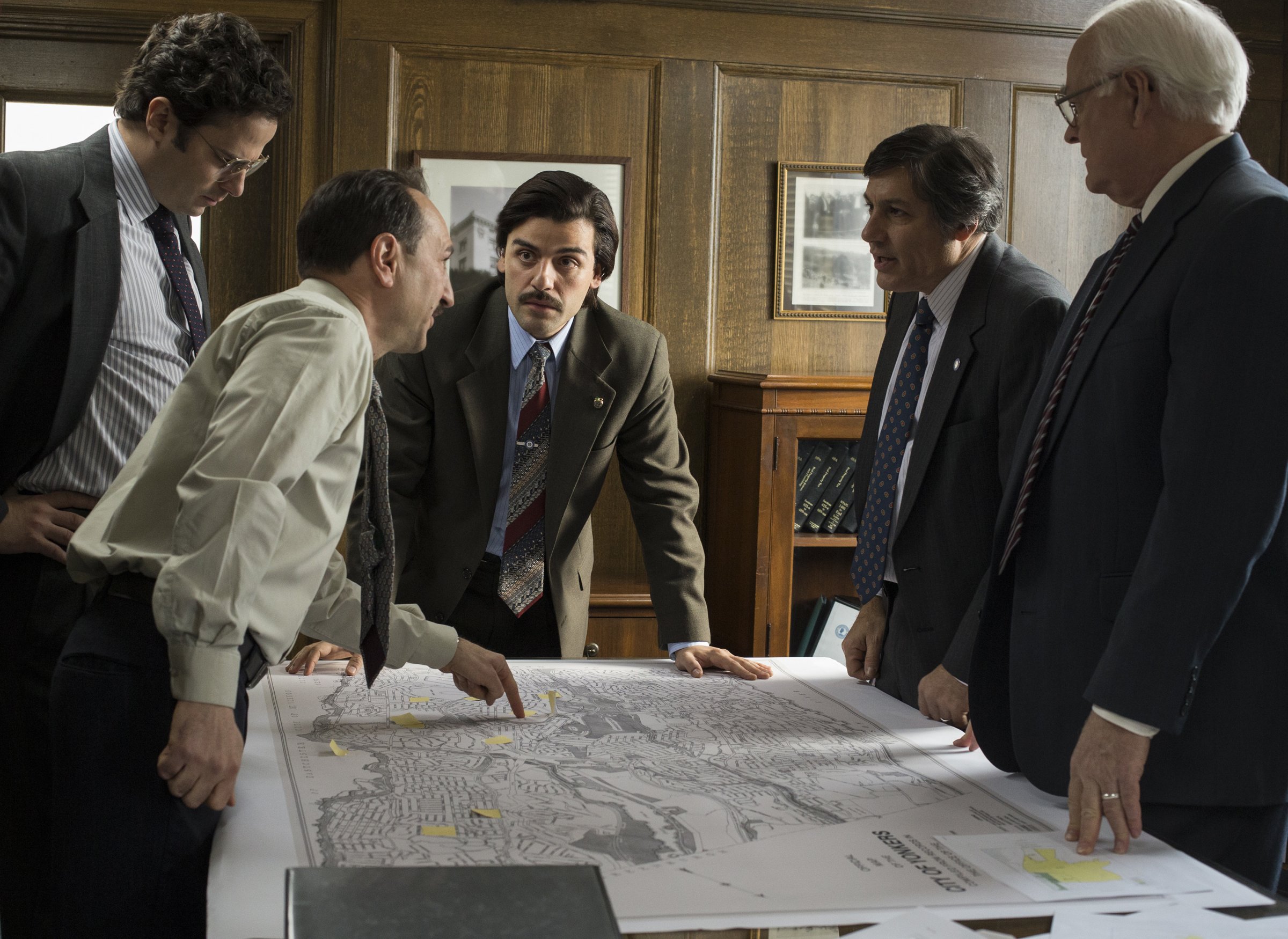
I’m going to tell you about David Simon’s absorbing new HBO miniseries, Show Me a Hero (premieres Aug. 16), but first I need you to work with me. Suspend, if you can, the belief that a period TV drama about a battle over housing policy is going to be boring.
As countless HGTV shows know, there are few things in the average life more fraught with stress, emotion and psychic investment than obtaining and keeping shelter. A home is not just four walls. It’s physical and financial security, a repository of self-image, a vessel of hopes and fears.
It’s certainly not boring to the white homeowners of east Yonkers, N.Y., circa 1987, who at the beginning of Hero are frothing in rage over a judge’s order that the midsized city desegregate its public housing by building units on their side of town. It’s not boring to Nick Wasicsko (Oscar Isaac), elected the youngest mayor of a major U.S. city, whom we meet chugging Maalox from the bottle like a protein shake. And it’s certainly not boring to the housing-project residents Hero introduces one by one, for whom four walls in a more peaceful neighborhood could mean a second chance at life.
Based on a nonfiction book by the New York Times‘ Lisa Belkin and cowritten by Simon’s former Baltimore Sun colleague William F. Zorzi, the six-part Hero works journalistically from the inside out, starting in City Hall. Everyone in Yonkers government knows the city faces bankruptcy from fines if it doesn’t comply with the court order. They also have every political incentive to resist anyway. Wasicsko himself rides to office on a tide of civic rage because he supported a court appeal that the pragmatic previous mayor (Jim Belushi) knew was pointless.
But even as he campaigns, he’s unsettled by the ugly forces carrying him–“That Jew judge ain’t gonna build that garbage nohow!” one voter yells–and once he’s elected and has to implement the order anyway, the tide washes back over him in the form of his constituents’ spit. As dated as the late ’80s fashions are here, the small-scale racial politics are sadly current. Isaac, wearing Wasicsko’s soup-strainer mustache like a 50-pound weight, masterfully shows his youthful energy and optimism curdling into gallows humor and bitterness. (Between Isaac and True Detective‘s Colin Farrell, 2015 is becoming The Year of the Sad Mustache.)
Meanwhile, Hero dips in and out of the stories of the black and Hispanic residents of the west side projects–single mothers, mostly, trying to hold families together in a place of concentrated dysfunction. Hero, directed by Paul Haggis, has an acute sociological eye for how the projects alter the smallest human interaction: a flirty moment between two young lovers is chilled by a two officers giving them the stink-eye from a passing Yonkers P.D. cruiser.
Show Me a Hero is to Simon’s The Wire as The Silmarillion is to The Lord of the Rings: pure uncut wonkery, without the genre trappings of a cop story. This is a show that will build a scene around housing expert Oscar Newman (Peter Riegert), explaining his “defensible space” theory–that small, discrete homes, like the planned townhouses, promote a sense of investment–and actually knows how to dramatize it. The themes are a natural evolution of Simon’s urban oeuvre (also including The Corner and Treme) which contrasts personal stories with the greater power of impersonal forces.
Haggis, known for Crash–the Oscar-winning 2004 ballpeen hammer of race-and-class-consciousness–proves a good fit for the material, roving across Yonkers to capture a postindustrial city divided by color and politics but united by economic fear of falling. (The soundtrack is almost exclusively music by Bruce Springsteen, official troubadour of East Coast decline.)
Contrary to its title (from F. Scott Fitzgerald’s “Show me a hero and I’ll write you a tragedy”), there aren’t unambiguous heroes here. Wasicsko eventually becomes a champion of the housing, at great cost to him and his young wife Nay (Carla Quevado), but it’s as much out of pragmatism and spite as principle. The opposition is less well-drawn. Alfred Molina blusters and mercilessly sucks an omnipresent toothpick as a race-baiting councilman. The main entree to the “I’m not a racist, but…” white homeowners is Mary Dorman (Catherine Keener), a townhouse opponent who becomes turned off by the blatant racism of some of her neighbors; she’s a key link between the sides, but more a device than a character.
But the plot advances, slowly and inexorably as the gears of bureaucracy, and Hero‘s emotional power builds as it focuses on the townhouses’ new residents and the initiative’s power to change their lives. Lives and careers are destroyed along the way, and the triumphs are small, like the sight of a young boy running in circles in a tiny yard, on a patch of grass that’s his own.
Show Me a Hero ends poignantly yet–considering that Simon’s worldview is so bleak he calls his blog The Audacity of Despair–hopefully. It’s just a distinctly David Simon brand of hope: the kind that says the victories we can hope for in this life are modest, and not unlike keeping a home, they involve a hell of a lot of hard work and maintenance.
More Must-Reads from TIME
- Cybersecurity Experts Are Sounding the Alarm on DOGE
- Meet the 2025 Women of the Year
- The Harsh Truth About Disability Inclusion
- Why Do More Young Adults Have Cancer?
- Colman Domingo Leads With Radical Love
- How to Get Better at Doing Things Alone
- Michelle Zauner Stares Down the Darkness
Contact us at letters@time.com